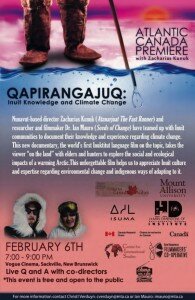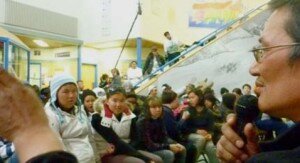Project Summary
The Inuit Knowledge and Climate Change (IKCC) project is a collaboration between Zacharias Kunuk and Isuma Productions (acclaimed Inuit filmmakers of Atanarjuat The Fast Runner), Nunavut Independent Television (NITV), Dr. Ian Mauro (an environmental and social scientist, Mount Allison University) and communities across Nunavut. In the spring of 2009, Kunuk, Mauro and their crew conducted 63 climate change interviews with Inuit Elders, hunters, women and youth in Pangnirtung (n =24), Igloolik (n=15), Resolute Bay (n=10) and Iqaluit (n=6) as well as with climate change scientists (n=6) and other experts (n=2). In each location, the IKCC team conducted extensive community consultations, seeking input and guidance from hamlet and youth councils as well as the local hunter and trapper organizations, and travel “on the land” with local people to document climate change. This approach ensured that outcomes were community-based and increased the legitimacy and impact of the overall project and associated film.
Project Goal
The overall goal of the project was to develop multi-media research and education tools that promote Inuit knowledge and climate change in collaboration with Nunavut based communities. Multimedia research tools were developed that explored the following topics:
- community and environmental health;
- wildlife management regarding polar bear and seals;
- adaptation planning related to environmental change; and
- public policy regarding Canada’s north and its people
The final outcome of the project is the feature-length film Qapirangajuq: Inuit Knowledge and Climate Change (www.isuma.tv/ikcc), which is the world’s first Inuktitut language feature film on climate change, and the associated project website. Content is continually uploaded to our website and Isuma plans to expand it as a tool to explore topics in the film.
Health and Adaptation
A major focus of this project related to climate change and associated health issues. The IKCC team interviewed Elders and hunters, scientists, as well as community public health nurses about the health-related aspects of climate change.
Some Key Concerns
- Unpredictable weather was viewed as a major threat to physical and cultural well-being.
- Numerous Elders and hunters spoke about how climate change is affecting the health and quality of animals and associated country foods, such as seal, caribou and whale.
- Participants were concerned that melting permafrost might adversely affect their communities.
- Interviewees were concerned about changes in the increased temperature and intensity of the sun.
Positive Outlook
- Despite many of these challenges, most participants were quick to point out that Inuit are a highly adaptable people, and that they have survived past climate change events.
- Many locals spoke about potential benefits associated with climate change, such as less extreme winter temperatures, increased time for boating in summer and influxes of new and edible species.
Building Capacity
Video training courses for youth
- Youth-focused training has had a major impact in participating communities, increasing awareness about climate change, while offering young Inuit tangible video skills and opportunities for cultural expression.
- Offering local high-speed intranet access to IsumaTV at local high schools and other facilities in participating communities
Research Implications – Proposed Research Model
The IKCC project, conducted entirely in Inuktitut, and using video technology to record Inuit knowledge is a model for how to respectfully carry out research in indigenous communities. Elders and hunters immediately recognized the importance of the video-based approach, given that it visually credited them with the knowledge being shared, but also allowed for widespread communication of this information. Participants in this project felt respected and trusted the IKCC team, given that it was largely comprised of fellow Inuit. Arguably, the strength of the IKCC approach was based on partnerships between academic and community-based researchers and the insightful participants they interacted with. This allowed for a co-production of knowledge, between the research team and communities, and ensured that Inuit were involved in decision-making regarding the project and its outcomes throughout.

Next Steps
The film continues to be screened around the world. Notable screenings include:
- Congress of Social Sciences and Humanities, Fredericton, UNB, May 31, 2011.
- Opening Night Film of Smithsonian Institutions Indigenous environmental film Festival in New York City, March 30, 2011.
- Closing film of Environmental Film Festival, Washington DC, March 27th, 2011.
- ArcticNet Annual Meeting, Ottawa Ontario, December 15, 2010.
- Screening for Canadian Parliamentarians, Ottawa, Ontario, November 24, 2010.
- University of Winnipeg’s Arctic Summit, Winnipeg, Manitoba, November 9, 2010.
- ImagineNative Film and Media Arts Festival, Toronto, Ontario, October 23, 2010.
Kunuk and Mauro will be taking the film on a tour of Atlantic Canada in February, 2012. They will also be presenting the outcomes of the film at the International Polar Year (IPY) 2012 conference in Montreal, April 22-27, 2012.

